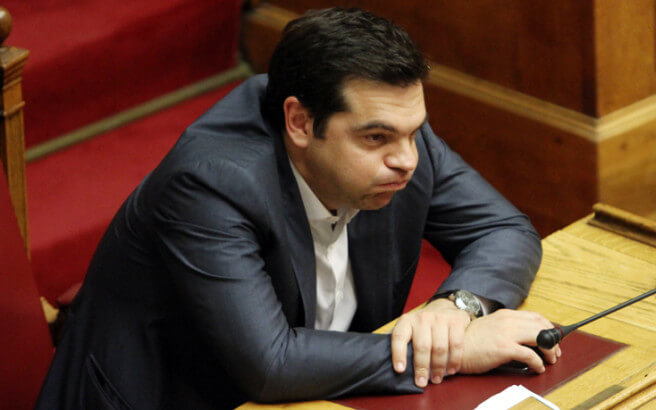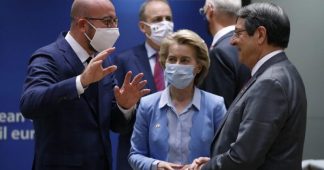By Herman Michiel (*)
Aug. 3, 2020
On 23 July, the vast majority of the Left Group (GUE/NGL) in the European Parliament approved, together with the right and mainstream parties, a resolution which fundamentally contradicts left-wing views in general, and the programmes of left-wing parties in the EU in particular. The resolution adopts a position on the ‘European deal’ of 21 July, in which, after days of negotiations, the European heads of state and government reached an agreement on a European recovery plan and the multi-annual budget.
Parliament corrects the ‘deal’
In short, the deal of 21 July meant that the European Commission’s proposal was updated here and there to meet the objections of the Netherlands, Austria, Denmark, Sweden and Finland (the ‘frugal five’) who felt that too much money was going to southern member states (Italy, Spain, etc.) Various budget items were therefore revised downwards. For example, the Just Transition Fund, an item that had to support certain regions in order to become climate-neutral, was cut; an amount of 3 billion € earmarked for support to the health sector was scrapped altogether. Reason for opposition from the left, yes. But…
Parliament’s resolution states in paragraph 14 that ‘targeted increases on top of the figures proposed by the European Council should be made’ for a range of programmes. The list that follows contains acceptable topics such as health, climate, culture…, questionable topics (the ‘digital agenda’, InvestEU etc: investments for the benefit of whom?) but also a number of topics that are downright unacceptable to the left, which we will discuss further below.
The resolution was approved with a 68% majority by Christian Democrats (PPE), Social Democrats (S&D), Liberals (Renew), Greens, and also by the ‘radical’ left of the Confederal left fraction GUE/NGL. Of its 39 members, 29 voted in favour, including the members of Die Linke, of SYRIZA, of Mélenchons La France Insoumise, of Unidos Podemos, of the Portuguese Bloco and the Belgian PVDA/PTB. The two members of the Portuguese Communist Party abstained, and in the end there were 5 votes against: those of the Swedish Left Party, the Danish red-green Unity List, the Dutch Party for the Animals and three independent Irish MEPs.
Unacceptable: support for the militarisation of the EU
The resolution states that Parliament wants the Defence Fund to have more resources than what the ‘deal’ entailed. Now this Defence Fund is a surreptitious way of channelling European money to the military industry. Although the EU budget is not allowed to support military projects, this is done under the guise of ‘industrial policy’. And the 21 July deal grants ‘only’ 7 billion for this Fund. The military-industrial lobby is of course disappointed, because initially 13 billion € was foreseen. mobility’.
Who would have thought that the left-wing group in the European Parliament would help the military lobby in its search for more public funds? As pointed out by Andreas Wehr, former collaborator of the left-wing group in the Parliament, GUE/NGL has always opposed military plans of the EU in the past. This has changed since 23 July. This is also a blow to the peace movement, which has always fiercely resisted the Defence Fund.
Unacceptable: support for Fortress Europe
The resolution calls for more money to be made available for border management, including the Integrated Border Management Fund. By endorsing this resolution, the left-wing group therefore calls for the strengthening of Frontex, the EU’s increasingly militarised approach to migration and asylum policy, responsible for thousands of drowning people in the Mediterranean, for outsourcing border surveillance to questionable regimes, a policy that has already been condemned by organisations such as Amnesty International or Médecins Sans Frontières. The fact that the representatives of Die Linke also approved this is doubly astonishing, given that this party has always spoken out strongly against Fortress Europe. Here too the title of Andres Wahr’s article fits: “What do we care about the election program?”
Unacceptable: silence about neoliberal coercion
The resolution is silent in all languages on the conditions that will be attached to the allocation of grants and/or loans from the Recovery Fund to the Member States. However, it is absolutely clear that ‘reforms’ will be demanded. Member States must submit a ‘National Reform Plan’ that follows the indications of the European Commission within the framework of the European Semester. A member state, let us say: the Netherlands, which feels that another member state, let us say: Italy, is not adhering to the reforms, can stop payment from the recovery fund. By signing a resolution that is silent about this, the left fraction implicitly agrees with this perverse game of ‘money in exchange for reforms’; anyway, it was as little a breaking point as were the Defence Fund and the strengthening of the European Border Guard. And say that the six MEPs of the Greek SYRIZA are among the co-signatories of this resolution; one might have thought that they had some experience in in neo-liberal conditionality…
No “accidental” misstep
The position taken by the left seems so illogical that one would be looking for coincidental reasons that made it so far. Even if this were a serious mistake, perhaps the motion for a resolution was not thoroughly reviewed, or it was maybe ambiguous? But that is not the case. The left-wing group tabled several amendments, including one to remove the demand for increased support for the Defence Fund; the amendment was rejected, but this proves that parliamentarians knew very well what they were approving. I have also enquired with two members of the GUE/NGL who I can assume belong to the left of the group: Marc Botenga who was elected in 2019 as the candidate of the Belgian PVDA/PTB, and Miguel Urbán Crespo, leader of the anticapitalist movement within the Spanish Podemos. The anticapitalistas left Podemos in May because they saw in the coalition with the social democrats of Prime Minister Sánchez a change of strategy “that no longer opposes the political and economic standards of the system”. A clear position of principle, but why not apply it in the European Parliament? In his answer to me, Urbán Crespo points to the context that led to his approval:
“The resolution criticises the Council’s position [the ‘deal’], not openly opposing it but rejecting much of its essence, in contrast to the euphoria about the ‘historic’ summit of heads of state and government. Of course, this global attitude does not mean approval with the whole text, which contains very negative elements like the one you mention in your e-mail. But politics also means making choices. And at that time, we thought it was more important politically to add our voice to a general criticism of this agreement, rather than commenting on specific points”.
Marc Botenga confirms that it was on the basis of a ‘global evaluation’ that he approved the resolution:
“In the European Parliament, unfortunately, even the most social resolution will celebrate market forces. That’s why you make a global evaluation of every text. I supported this resolution because, on the one hand, it recognises and welcomes the principle of joint borrowing and solidarity transfers in the face of conditional loans as we have known them in recent years and, on the other hand, it clearly rejects the proposal for a European budget made by Council President Charles Michel. This is the central message of the resolution and it is important.
But I agree, the positive central message of the parliamentary resolution should not blind us to a number of problem areas. There are a number of them. Firstly, the resolution refuses to criticise the embedding of the aid fund in the European Semester. Secondly, there is no clarity about who will ultimately foot the bill. For me, own resources for the European budget have to be paid by large multinationals through, for example, an effective tax on financial transactions and a European effective minimum tax rate that tackles tax havens and tax dumping within the EU. Thirdly, there is indeed the issue of armaments and the geopolitical dimension that you mention.
We are neither silent on these issues, nor do we support them. On the contrary, with GUE/NGL – but also me personally – we tabled several amendments to denounce the European Semester, to make European multinationals and millionaires foot the bill and to delete the mention of the European Defence Fund, for example. We will continue to fight this battle. A budget proposal that sets the wrong priorities will obviously not be supported by us”.
Speaking of a ‘positive central message with a number of problems’ seems to me to be a very questionable result of a ‘global evaluation’. The ‘problem points’ that Botenga himself mentions strongly suggest that the central message is negative. The European Semester means submission to the neoliberal dogmas. The PVDA/PTB knows better than anyone who will pay the bill, and a longing for the contribution of large multinationals and a financial transaction tax will do nothing to change that. But in the meantime a text from the right gets the blessing of ‘extreme-left’ as the icing on the cake…
Here, too, the question can be asked: what is the purpose of election programmes? In its European election programme of 2019, the PVDA/PTB wrote: “We are stopping research into and investment in offensive military weaponry such as armed drones or fighter planes. However, the European Defence Union is completely going in the other direction. We read in article 42 of the EU Treaty: ‘Member States undertake to progressively improve their military capabilities. The European Defence Fund (EDF) allocates roughly EUR 13 billion from the EU budget to defence research programmes and to the development and procurement of new weapons, communication and transport systems and other weapons and technologies.”
These two left-wing MEPs, whom I thank for their quick response to my question, are obviously under the influence of an undemocratic tendency ingrained in the European institutions. To the extent that a national parliament still functions more or less as it should, one can recognize a conflict between left and right in it. But in the European Union, legislation is created by a complex three-way game between the European Commission (EC), the European Parliament (EP) and the Council (C). Depending on the case, ‘coalitions’ EP+EC vs. C or EP+C vs. EC etc. are formed. “If the European Parliament wants to achieve something against the Commission or the Council, it has to secure a majority”, it is often said, and since the large majority of the Parliament is on the right, left-wing MEPs who follow this logic vote along with right-wing MEPs….
Quo vadis “Izquierda”?
A bit cynical perhaps, but this question was the title of a piece written by Miguel Urbán Crespo shortly after the 2019 European elections, in which the left-wing parties in Europe achieved a very disappointing result, and the left-wing group in the European Parliament GUE/NGL was reduced from 52 to 39 seats. In this he writes:
“The beginning of a new institutional cycle in the European Union should prompt us to take a thorough stock of the situation of the left. We need to reorganise ourselves and conduct a fundamental strategic debate. The new EU alliances should be understood as a rebuilding of a social-liberal bloc with the Greens, liberals and socialists, a bloc that reaffirms the relentless domination of the Brussels consensus. The response to this new EU administrative bloc will be the main challenge for the Left, which must leave mourning for the results [of the European elections] as soon as possible. Perhaps the second challenge facing the European left is how to behave politically, while we are the smallest bloc in the European Parliament. This means that we should not focus so much on parliamentary politics, but on reconnecting with new social movements and the grassroots classes”.
A clear analysis with valuable suggestions, but what is the purpose of this if the (anti-capitalist) left loses its face due to bad parliamentary politics? What is the raison d’être of a left-wing group when, after ‘contextualizing’ the situation, it gives a push to right-wing politics? Is this how they think they will reconnect with new social movements and the grassroots classes? Do they think they will do better in the European elections of 2024 as the slightly more left-leaning little brother of social democrats and greens? If the radical left doesn’t want to make itself superfluous, it has to completely resource itself, develop a strategy and … stick to it.
(*) Herman Michiel is editor of the Flemish-Dutch website www.andereuropa.org











